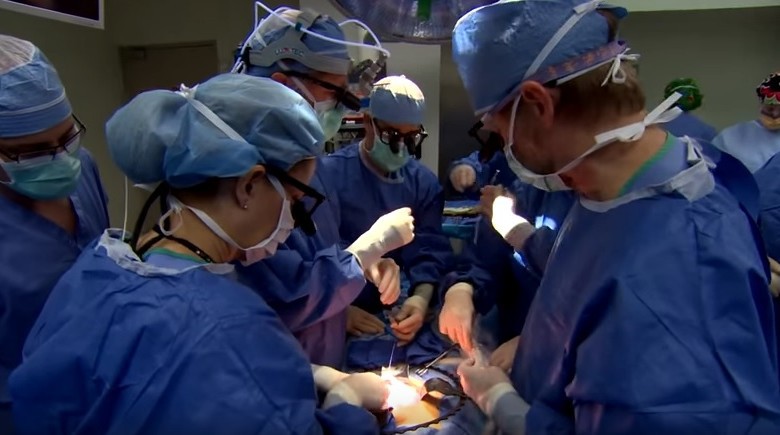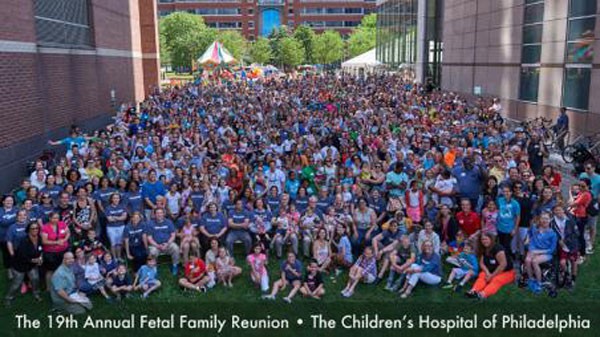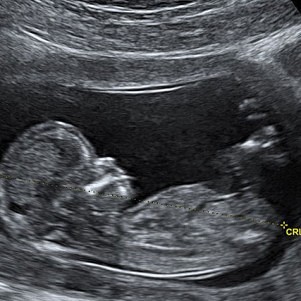Mass. teen an early recipient of pioneering fetal surgery
By Lori Brannigan Kelly | January 18, 2016, 8:04 EST
 Doctors perform fetal surgery as documented in “Twice Born — Stories from the Special Delivery Unit.” (via YouTube, PBS)
Doctors perform fetal surgery as documented in “Twice Born — Stories from the Special Delivery Unit.” (via YouTube, PBS) More than 16 years ago, in May 1999, Massachusetts teen James Sprissler underwent a pioneering and life-altering procedure at Vanderbilt University Medical Center in Nashville, Tennessee. But Sprissler’s surgery was not like most surgeries. Sprissler, a Stoughton native who was diagnosed with spina bifida while in his mother’s womb, underwent surgery in utero.
Decades ago, there was not much a pregnant mother could do to help her unborn child diagnosed with spina bifida or other rare birth defects. But, thanks to medical advances and the work of some pioneering doctors, the possibility of fetal surgery today offers hope to families like the Sprisslers awaiting babies with difficult diagnoses.
Thanks to medical advances and the work of some pioneering doctors, the possibility of fetal surgery today offers hope to families awaiting babies with difficult diagnoses.
Robert and Kim Sprissler, who agreed to be interviewed for this article, learned of James’s spina bifida diagnosis at a routine pregnancy exam. Spina bifida is a birth defect in which an area of the spinal column (or, in an infant, the “neural tube”) doesn’t form properly. A spina bifida abnormality leaves a section of the spinal cord and spinal nerves exposed through an opening in the back.
At that time, no child in Massachusetts had been born after having surgery in utero. But, encouraged by a family friend whose child underwent a similar procedure, the Sprisslers started to do some research. They soon discovered that Vanderbilt University Medical Center had, that year alone, performed 30 successful fetal surgeries. The Sprisslers were determined that their baby would undergo the procedure.
There was one major obstacle: the surgery was not covered by the Sprisslers’ health insurance. So, the family raised funds by holding golf and bowling tournaments and selling candy. They organized fundraisers at their local American Legion, and Robert’s company chipped in. The family raised $30,000 in three weeks. Soon, they were on their way to Nashville.
“It wasn’t so much whether or not our child walked,” remarked Robert Sprissler, “but that the (post-birth) procedure to ease hydrocephalus is so painful. Did we want to put our son through the experience of having a shunt placed in the back of his neck to remove water every month, every year, or every couple of years? We didn’t want to put our son through that type of pain.”
The end result? Kim Sprissler’s baby underwent a successful fetal surgery at 25 weeks and her son James was born at 34 weeks of gestation.
After James’s birth, the Sprisslers were cautioned that the likelihood of having more children was extremely remote; another child would, quite probably, have the same issues as James. But five years later, they had a daughter, Elisabeth. Elisabeth was born without birth defects.
“My son is happy and healthy and living life the way he wants, on his terms.” — Robert Sprissler, father of teen who received surgery in utero
Today, while James has no sensation from the waist down, he does have muscle control, and to his parents’ – and doctors’ – amazement, he is able to walk. James travels to Boston Children’s Hospital every year, specifically to ensure that his bladder and legs are properly working. Robert described his teenage son as “a happy kid. He plays baseball. He’s a big wrestling fan.”
“My son is happy and healthy and living life the way he wants, on his terms,” Robert said.
Although still rare, surgeries like the one James underwent in 1999 are becoming more common.
Last fall, surgeons at Missolua, Montana’s Community Medical Center’s Neonatal Intensive Care Unit announced that they had delivered prematurely a baby who had undergone fetal surgery 12 weeks earlier.
At 22 weeks of development, “Baby Malcom,” who earlier had been diagnosed with hydrops fetalis, a condition that causes fluid to build up in the chest cavity and stunts normal lung growth, underwent a procedure where doctors installed a pair of drainage shunts in Malcom’s chest to continually drain out the chest cavity.
“It just fixed him. For whatever reason, it cured him from a lung perspective,” Dr. Bardett Fausett, who performed the operation, told the Montana Independent Record.
In November 2015, Malcolm was born prematurely at 34 weeks.
Of the approximately 4,000 fetal surgeries performed worldwide, a quarter of them have been performed at the Children’s Hospital of Philadelphia.
One month later, surgeons at the Shiraz University of Medical Sciences in Iran reported performing that hospital’s second such surgery at the Ghadir Mother and Child Hospital. The first was carried out in 2012. The recipient of that surgery, now aged 3, is living a healthy life.
Perhaps the leader in the field of fetal surgery is the Children’s Hospital of Philadelphia (CHOP), which performs a fetal surgery approximately once a week.
Of the approximately 4,000 fetal surgeries performed worldwide, a quarter of them have been performed at CHOP, which employs a team of doctors who are pioneers in fetal diagnosis, fetal surgery and fetal medicine.
Some conditions targeted by the Center include the EXIT procedure (ex utero intrapartum treatment procedure – used to deliver babies who have airway compressions); lower urinary tract obstructions (LUTO); Twin-Twin Transfusion Syndrome (TTTS, also known as Feto-Fetal Transfusion Syndrome, or FFTS, at its most severe has a 60-100 percent mortality rate); and spina bifida.
The Garbose Family Special Delivery Unit (SDU) at CHOP is the world’s first birthing unit within a pediatric hospital dedicated to healthy mothers carrying babies with serious and life-threatening birth defects, allowing for immediate neonatal evaluation and assessment. In many CHOPs cases, if surgery is not performed, the diagnosis for the baby is death.
In June, more than 400 children treated prenatally by CHOP came together for the “19th Annual Fetal Surgery Family Reunion.”
CHOP’s groundbreaking work is documented in the PBS series “Twice Born – Stories from the Special Delivery Unit.” Produced by Trailblazer Studios, “Twice Born” focuses, in large part, on Dr. N. Scott Adzick, Surgeon-in-Chief and Founder of the Center for Fetal Diagnosis and Treatment Director.
“It’s a miracle and a privilege to take care of patients, typically babies,” Adzick told PBS filmmakers in “Twice Born.”
“Babies are the future, right? What could be more compelling than a baby?”
Lori Brannigan Kelly is a freelance writer who lives in South Boston. She can be reached at [email protected].
NBPLifeABC














